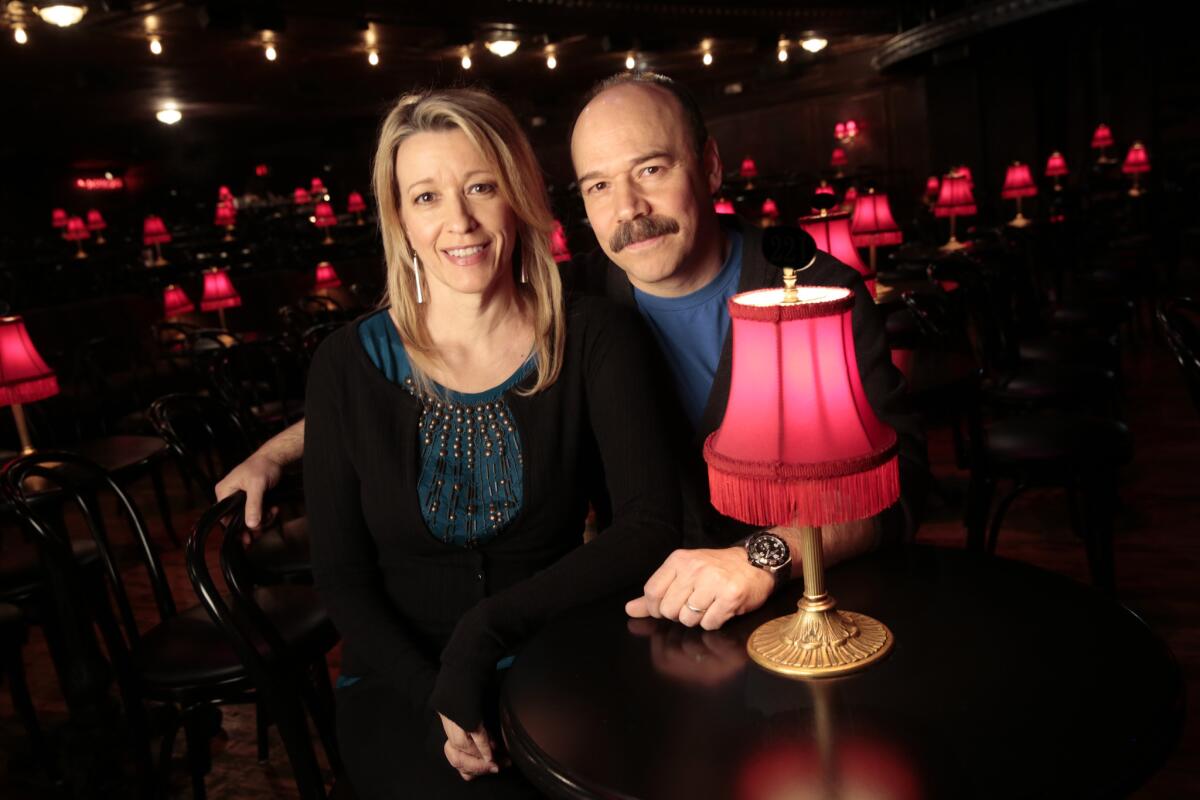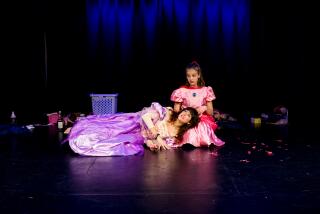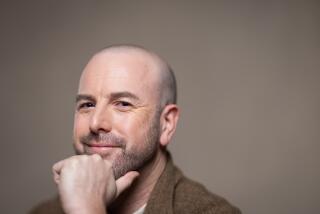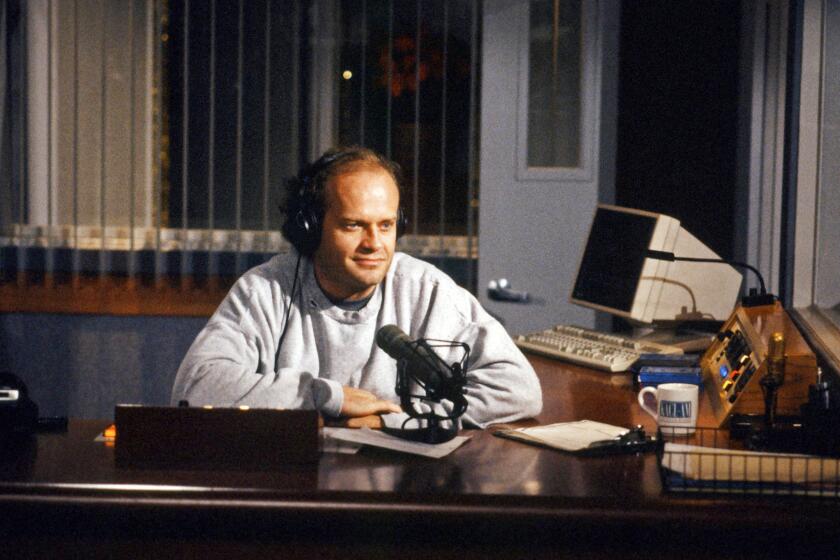‘Cabaret’s’ Linda Emond, Danny Burstein enjoy adding their imprints

Linda Emond has a collection of tiny email printouts from well-wishers in her spacious dressing room, where gauzy purple curtains and a soft white couch create a sense of peace in an otherwise hectic area of Manhattan just off Times Square.
One email she saved is an exchange with Danny Burstein, who plays Herr Schultz, the Jewish fruit seller and love interest to Emond’s character, Fraulein Schneider, in the latest production of “Cabaret” by the Roundabout Theatre Company.
“I feel so lucky that I get to be in love with you eight shows a week,” Emond wrote to Burstein when rehearsals for the show started.
He wrote back, “I love you already,” and signed it, “Your Jew.”
This staging of “Cabaret” is a revival of the 1998 Tony Award-winning revival of the show as first envisioned by Sam Mendes in ’93 for a London production. It’s directed once again by Mendes and choreographed by Rob Marshall and stars Michelle Williams as Sally Bowles and Alan Cumming as the Emcee. Cumming played the role in both the ’93 and ’98 productions, both of which reference sex more explicitly than the original 1966 version.
But for all the raunchiness of the latest staging of Cabaret, the characters played by Emond and Burstein bring an innocent sweetness to the show that reminds the audience that at its core “Cabaret” is about the terrifying changes going on in Nazi Germany before World War II. The Emcee struts around the stage with red-painted nipples and a swastika on his butt cheek and Sally Bowles sells her body for cash and fame, but the love story of Herr Schultz and Fraulein Schneider is more grounded and relatable.
Schultz woos Schneider, the landlady for a block of flats, by bringing her fruit from his stand, including a pineapple. They finally decide to marry, but at the celebration, attended by Sally Bowles and her American love interest, Schneider’s tenant, a Nazi sympathizer warns Schneider against marrying a Jew.
“We’re the hopeful part of the story, early on,” Emond said. “Of course, it doesn’t work out well for us in the end.”
Their performances netted each a Tony nomination: Burstein for performance by an actor in a featured role in a musical and Emond for featured actress in a musical. That theirs are “Cabaret’s” only Tony nods speak to the power of veteran actors in a season of young Hollywood actors on Broadway: Zach Braff in “Bullets Over Broadway,” James Franco in “Of Mice and Men,” and even “Cabaret’s” Williams.
Emond first appeared on Broadway as Abigail Adams in the 1997 Broadway revival of “1776”; Burstein’s first role on Broadway was in 1992.
The experience can be useful. During a recent performance, when someone in the audience was making loud noises during Emond and Burstein’s scene together, they knew what to do.
“We had to dance with each other, so we hugged each other close, because each one of us was as good as the other one was,” said Burstein, who is as down-to-earth and friendly as the character he plays. It was helpful that the actors trusted each other to keep performing perfectly through chaos in the audience. “That kind of stuff is very special, and it comes from experience.”
Like many experienced actors, Burstein and Emond have learned habits that help them sustain the grueling schedule of eight performances a week. They’ve learned which days of the week will be a struggle and which days are for relaxing and even, for Emond, what’s best to eat before a show (For “Cabaret,” she says she craves kale and chicken soup; for “Death of a Salesman,” where she starred opposite Philip Seymour Hoffman, she craved something salty like chips and a sandwich).
But the addition of new Broadway actors, like Michelle Williams, helped energize the show, both actors say, since newbies arrive with an extra jolt of energy to get it right. Emond was good friends with Williams even before the show was cast — they appeared together in 2004 in Chekhov’s “The Cherry Orchard” at the Williamstown Theatre Festival — and said that walking her through the phases of a production — what’s required in development, rehearsals, tech, previews — made her realize just how long she’s been doing this.
“I realized, ‘Gosh, I’ve learned a lot over the years,’” said Emond.
Still, it was a challenge for Mendes to persuade both veterans to do the show. They thought it had already been done before and didn’t want to step into pre-formed characters.
When his agent called with the “Cabaret” offer, Burstein had already decided to do a different show in the spring, but Mendes insisted they meet and talk. Burstein agreed, thinking they’d meet in New York, but since Mendes was in London, Burstein flew there for 24 hours, on his one day off from his fall show, “The Snow Geese,” to talk.
“How could I turn it down?” said Burstein about his thoughts after that meeting. “It’s a masterpiece of a musical, and there are only a few that are really perfect shows.”
The role of Herr Schultz is especially powerful, Burstein said, because he has to illustrate why so many German Jews initially thought the Nazis were harmless. His character can’t know about the horrors that are to follow or believe that such things could come to pass.
“He represents, in my mind, 6 million people who passed away,” Burstein said.
Emond was a harder sell. She said no to the role at first, figuring she could play Fraulein Schneider, who is usually portrayed as an older woman, in 15 or 20 years. But Mendes assured her that though this was a revival of a revival, it was going to be different and that she could bring to her character whatever she wanted, including more youth than usual. So she listened to the show’s music and then went with a few friends, including Williams, to Central Park to think about it. They persuaded her to say yes.
Whenever she reads about bigotry or hate in the news, she says, she’s reminded of why she’s glad to have done the show.
“It’s heartbreaking and infuriating, and I’m happy to be a part of something that has something to say about it,” said Emond, who has a photo in her dressing room of a woman’s arm tattooed with the date her grandparents died in Auschwitz.
The chance to put their own imprints on their characters, even in a revival of a revival, appealed to both actors. Emond asked for her clothes to be shabbier, since her character sings about being impoverished at the beginning of the show. Burstein wanted rounder shoulders, wrinkled jackets and pants, the clothes of a man who works all day and lives in a rooming house.
And though it had been done before, they say, each show allowed them to use their seasoned muscles to stretch more and more. They’re still perfecting it each and every show and say it’s more powerful than it was when they started performances. Even veterans, it seems, can keep improving.
“I love that there is the next night,” Emond said. “If something didn’t work, I can make it even better the next time.”
Burstein added: “I still have moments where I go ‘Oh, I’ve never really gotten that line out as good before.’ All along the continuum, it continues to get better and deeper and richer.”
More to Read
From the Oscars to the Emmys.
Get the Envelope newsletter for exclusive awards season coverage, behind-the-scenes stories from the Envelope podcast and columnist Glenn Whipp’s must-read analysis.
You may occasionally receive promotional content from the Los Angeles Times.










